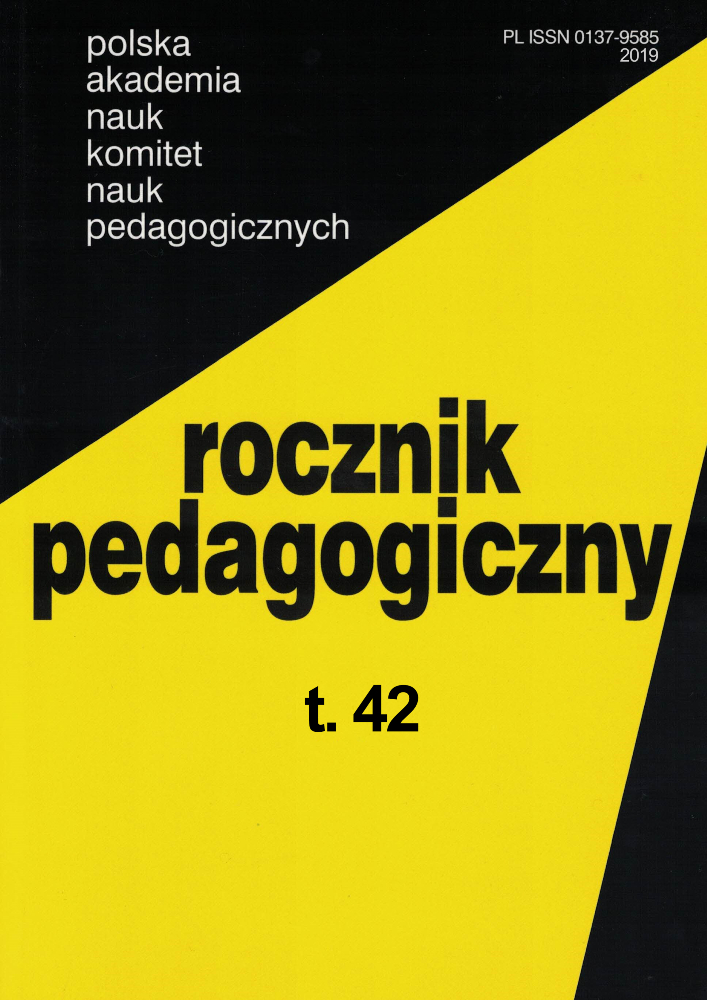Abstract
The article is preconceptual in its nature, as it is an introduction to a planned research project in the area of pedagogy and law. The author describes the research in current trends in modern childhood studies, choosing the protection of children’s rights in the event of their parents’ separation as the basic research category. This category will be analyzed in ontological, epistemological and meth- odological dimensions. In view of the growing scale of family breakdowns, it becomes justified to ask a question about the way of experiencing, understanding and constructing knowledge about the subject of pedagogical and legal interactions – the child themself. Building knowledge about a child whose parents separate is not only intended to expand and build interdisciplinary theoretical knowl- edge, but also to provide a basis for designing adequate tools and activities to protect the rights of a child experiencing their parents’ separation. This article provides an outline of a research concept aimed at protecting children’s rights. The article contains extensive justifications for the research topic and the framework of the methodological concept.
References
Amato P.R., The Consequences of Divorce for Adults and Children, „Journal of Marriage and the Family” 2000, 62 (4).
Beisert M., Rozwód. Proces radzenia sobie z kryzysem, Wydawnictwo Fundacji Humaniora, Poznań 2000.
Błażek M., Funkcjonowanie psychologiczne rozwodzących się rodziców, a ich postawy rodziciel- skie, „Polskie Forum Psychologiczne” 2015, t. 20, nr 3.
Błażek M., Rozwód jako sytuacja kryzysowa w rodzinie, [w:] Psychologia rodziny, red. I. Janicka, H. Liberska, Wydawnictwo Naukowe PWN, Warszawa 2014.
Błażek M., Kaźmierczak M., Pastwa-Wojciechowska B., Lewandowska-Walter A., Funkcjonowanie kobiet i mężczyzn w sytuacji rozwodowej – analiza psychologiczna, „Polskie Forum Psycholo- giczne” 2012, 17, s. 62–78.
Błażek M., Lewandowska-Walter A., Rozwód jako proces. Perspektywa dorosłych i dzieci, Wydaw- nictwo Difin, Warszawa 2017.
Borucka-Arctowa M., Kourilsky C. (red.), Socjalizacja prawna, Agencja Scholar, Warszawa 1993. Braver S.L., Shapiro J.R., Goodman M.R., Consequences of Divorce for Parents. Handbook of Di- vorce and Relationship Dissolution, [w:] Handbook of Divorce and Relationship Dissolution,
M.A. Fine & J.H. Harvey (eds.), Lawrence Erlbaum Associates Publishers, 2006. Czerederecka A., Ekspertyza psychologiczna: Sprawy dotyczące dziecka i rodziny. Problemy ro- dzinne i opiekuńcze, [w:] Ekspertyza sądowa, red. J. Wójcikiewicz, Zakamycze, Kraków 2002,
s. 401–404, 417–425.
Czerederecka A. (red.), Rodzina w sytuacji okołorozwodowej. Współczesne dylematy psychologicz-
ne i prawne, Wydawnictwo IES, Kraków 2018.
Czerederecka A., Rozwód a rywalizacja o opiekę nad dziećmi, LexisNexis, Warszawa 2010. Czerederecka A., Syndrom oddzielenia od drugoplanowego opiekuna (PAS) – przydatność diagnozy
w badaniach sądowych w kontekście krytyki zjawiska, „Nowiny Psychologiczne” 3, PTP, War-
szawa 2005.
Gardner R.A., Parental Alienation Syndrome vs. Parental Alienation: Which Diagnosis Should Eva-
luators Use in Child Custody Disputes?, „The American Journal of Family Therapy” 2002, 29
(2), TFG, UK, s. 93–115.
Gardner R.A., Recent Trends in Divorce and Custody Litigation, „Academy Forum” 1985, 29 (2), s. 3–7.
Gardner R.A., Should Court Order PAS Children to Visit/Reside with the Alienated Parent? A Follo- w-Up Study, „The American Journal of Forensic Psychology” 2000, 19 (3), s. 61–106.
Greene S., Anderson E., Forgatch M., DeGarmo D., Hetherington E.M., Risk and Resilience after Divorce, [w:] Normal Family Processes: Growing Diversity and Complexity, ed. F. Walsh, The Guilford Press, New York–London 2012.
Holmes T.H., Rahe R.H., The Social Readjustment Rating Scale, „Journal of Psychosomatic Rese- arch” 1967, Vol. 11, Pergamon Press.
Knutson J.N., Handbook of Political Psychology, Jossey-Bass Publishers, San Francisco 1973. Kozak M., Pogranicze pedagogiki i prawa – perspektywy interpretacji i integracji wiedzy peda- gogicznej i prawnej, [w:] Interdyscyplinarność i transdyscyplinarność pedagogiki – wymiary teoretyczny i praktyczny, red. R. Włodarczyk, W. Żłobicki, Oficyna Wydawnicza „Impuls”,
Kraków 2011.
Wallerstein J.S., Kelly J.B., Surviving the Breakup: How Children and Parents Cope with Divorce,
Basic Books, New York 2008.
License
Copyright (c) 1970 Małgorzata Turczyk

This work is licensed under a Creative Commons Attribution-NonCommercial-NoDerivatives 4.0 International License.
